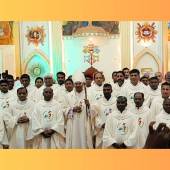India: Pope appoints new bishop of diocese of Kurnool

Pope Francis has appointed Father Johannes Gorantla, O.C.D. (51), priest of the Order of Discalced Carmelite, as the new bishop of Kurnool Diocese in South India, who currently serves as Rector, Collegio Teresianum, Rome.
Officials in Rome made the appointment public on Tuesday, February 27.
Father Johannes Gorantla, O.C.D., was born on February 27, 1974, in Nawabupeta, in the Diocese of Vijayawada.
He studied Philosophy at Sacred Heart Philosophical College, Alwaye, Kerela (1994–1997) and Theology at the Pontifical Institute of Theology Teresianum, Rome (1998–2001).
He made his Solemn Profession for the Order of Discalced Carmelites in April 2000 and was ordained priest for the same Order at Thallada, Khammam, on January 10, 2002.
He served as an assistant priest at Kalluru, Khammam, in 2002. He obtained his Licentiate in Sacred Scripture from Biblicum, Rome (2002–2006) and his Doctorate in Biblical Theology from the Pontifical Gregorian University, Rome (2006–2008).
He served as Provincial of the Discalced Carmelite Andhra Province (2 trienniums), Secretary of the OCD Inter-Provincial Council of India, and Consulter for the Diocese of Khammam.
Simultaneously, he served on the APBC Bible Commission and the APBC Commission for Proclamation (2008–2014). He was a Visiting Professor of Sacred Scripture at Jyothi Bhavan, Kalamassery, Kerala (2008–2015) and at St. Joseph’s Major Seminary, Khammam (2010–2015). He served as President of the Andhra Pradesh Religious Conference (APRCRI) and Vice Chairman of the APBC Commission for Catholic Education (2010–2014).
He served as Superior and Parish Priest of St. Pius X Monastery Parish, Nacharam, Archdiocese of Hyderabad (2014–2015), and then Definitor General of the Discalced Carmelites, Rome (2015–2021).
He served as Rector of Seminarim Missionum, OCD International College for Priest Students, Teresianum, Rome, from December 2021 to the present. From 2022 to now, he has been a visiting professor at Marianum, Rome, and a lecturer at Teresianum, Rome.
The Diocese of Kurnool is divided into two civil districts: Kurnool and Anantapur. Bishop Joseph Rajappa's appointment on June 12, 1967, marked the separation of these two districts from the Diocese of Nellore and their formation into the Diocese of Kurnool.
The French Jesuits worked in this area in the 1700s. Three French Jesuits rest in peace at Krishnapuram in Anantapur District.
After the Jesuits withdrew in 1773, the Paris Foreign Missionary Society took over church work. For the last 70 years, the Mill Hill Fathers have evangelized these areas. The Franciscan Fathers also labored in the western parts of the diocese for some time.
From January 18, 1988, until July 16, 1991, Bishop Mathew Cheriankunnel PIME succeeded him. Bishop Gorantla Johannes was appointed on January 6, 1993, and initiated many developmental activities in evangelization, education, health, and social development.
Many men's and women's religious congregations have undertaken activities in these fields. Bishop Johannes gave a new impetus to the pastoral activities in the diocese.
After the sudden demise of Bishop Gorantla Johannes on January 20, 2007, the Diocese of Kurnool has been waiting for the new bishop.
On February 8, 2008, Rev. Monsignor Anthony Poola assumed the role of Bishop of Kurnool and was consecrated on April 19, 2008. Later, Pope Francis appointed Bishop Poola Anthony as Archbishop of Hyderabad.
Monsignor Anthonappa Chowrappa has served as Kurnool Diocese's Apostolic Administrator since November 20, 2020.
The population in the diocese is 81,70,507 as of 2021, and 86 parishes within the Diocese of Kurnool are home to 102,967 Catholics. As many as 136 priests and 465 nuns work in various pastoral ministries. - With inputs from Pujitha Nagalli
Radio Veritas Asia (RVA), a media platform of the Catholic Church, aims to share Christ. RVA started in 1969 as a continental Catholic radio station to serve Asian countries in their respective local language, thus earning the tag “the Voice of Asian Christianity.” Responding to the emerging context, RVA embraced media platforms to connect with the global Asian audience via its 21 language websites and various social media platforms.














